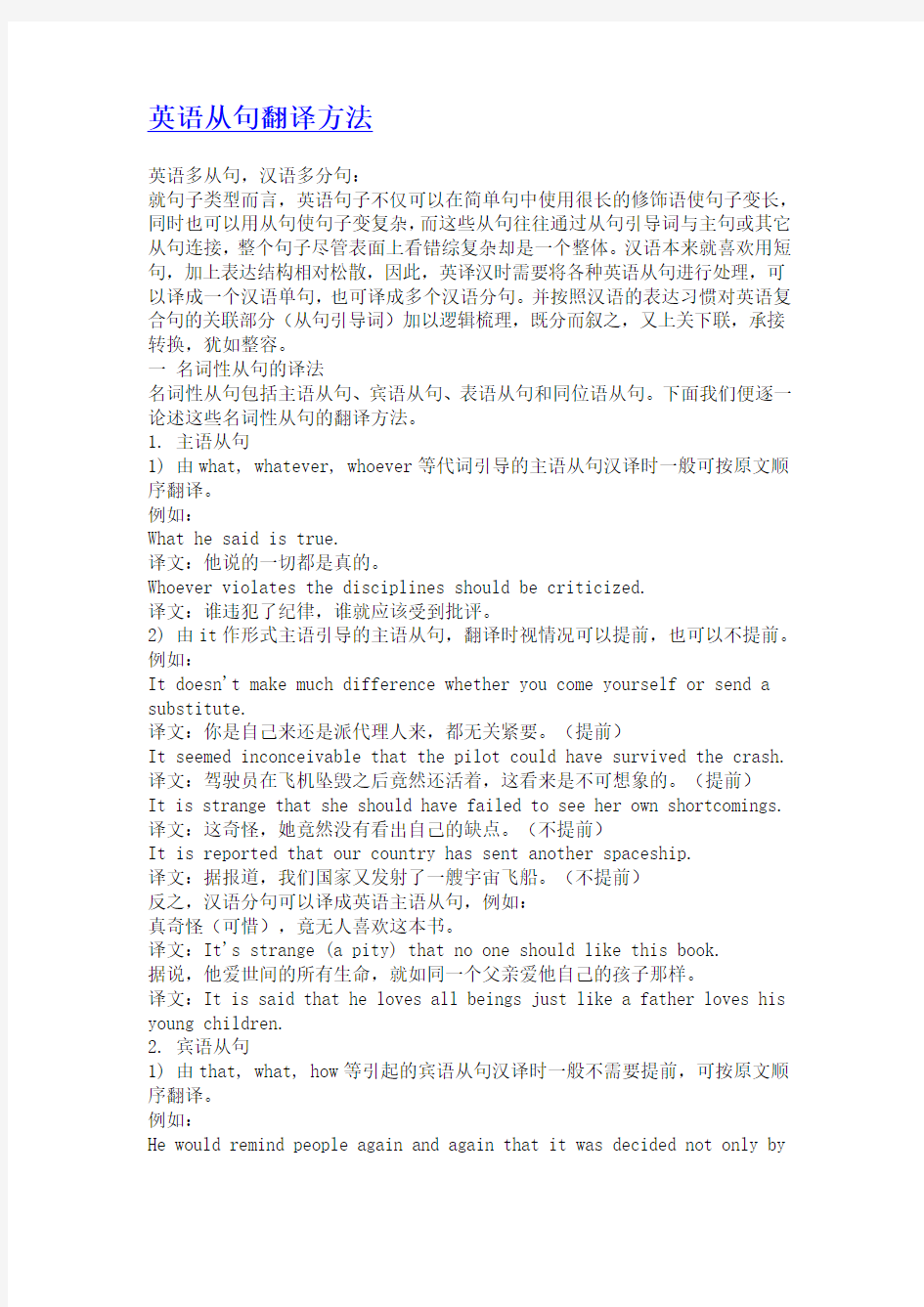英语从句翻译方法1

- 1、下载文档前请自行甄别文档内容的完整性,平台不提供额外的编辑、内容补充、找答案等附加服务。
- 2、"仅部分预览"的文档,不可在线预览部分如存在完整性等问题,可反馈申请退款(可完整预览的文档不适用该条件!)。
- 3、如文档侵犯您的权益,请联系客服反馈,我们会尽快为您处理(人工客服工作时间:9:00-18:30)。
英语从句翻译方法
英语多从句,汉语多分句:
就句子类型而言,英语句子不仅可以在简单句中使用很长的修饰语使句子变长,同时也可以用从句使句子变复杂,而这些从句往往通过从句引导词与主句或其它从句连接,整个句子尽管表面上看错综复杂却是一个整体。汉语本来就喜欢用短句,加上表达结构相对松散,因此,英译汉时需要将各种英语从句进行处理,可以译成一个汉语单句,也可译成多个汉语分句。并按照汉语的表达习惯对英语复合句的关联部分(从句引导词)加以逻辑梳理,既分而叙之,又上关下联,承接转换,犹如整容。
一名词性从句的译法
名词性从句包括主语从句、宾语从句、表语从句和同位语从句。下面我们便逐一论述这些名词性从句的翻译方法。
1. 主语从句
1) 由what, whatever, whoever等代词引导的主语从句汉译时一般可按原文顺序翻译。
例如:
What he said is true.
译文:他说的一切都是真的。
Whoever violates the disciplines should be criticized.
译文:谁违犯了纪律,谁就应该受到批评。
2) 由it作形式主语引导的主语从句,翻译时视情况可以提前,也可以不提前。例如:
It doesn't make much difference whether you come yourself or send a substitute.
译文:你是自己来还是派代理人来,都无关紧要。(提前)
It seemed inconceivable that the pilot could have survived the crash. 译文:驾驶员在飞机坠毁之后竟然还活着,这看来是不可想象的。(提前)
It is strange that she should have failed to see her own shortcomings. 译文:这奇怪,她竟然没有看出自己的缺点。(不提前)
It is reported that our country has sent another spaceship.
译文:据报道,我们国家又发射了一艘宇宙飞船。(不提前)
反之,汉语分句可以译成英语主语从句,例如:
真奇怪(可惜),竟无人喜欢这本书。
译文:It's strange (a pity) that no one should like this book.
据说,他爱世间的所有生命,就如同一个父亲爱他自己的孩子那样。
译文:It is said that he loves all beings just like a father loves his young children.
2. 宾语从句
1) 由that, what, how等引起的宾语从句汉译时一般不需要提前,可按原文顺序翻译。
例如:
He would remind people again and again that it was decided not only by
himself but by lots of others.
译文:他再三提醒大家说,决定这件事的不只是他一个人,还有其他许多人。
I understand that he is well qualified, but I feel that he needs more experience.
译文:我知道他完全够条件,但我觉得他需要更多的经验。
2) 用it作假宾语的句子,汉译时that引起的宾语从句视情况可以提前,也可以不提前,“it”不译。
I take it for granted that we should work hard.
译文:我理所当然地认为,我们应该努力工作。(也可译为:我认为我们应该努力工作,这是理所当然的。)
I consider it a great honor that I am chosen to attend the meeting. 译文:我被指定参加会议,感到十分荣幸。
反之,汉语分句可以译成英语宾语从句,例如:
史密斯回答说,他感到很遗憾。
译文:Smith replied that he was sorry.
我向他们讲清楚了,他们必须在上午十点前交卷。
译文:I made it clear to them that they must hand in their papers before 10 o’clock in the morning.
3. 表语从句
表语从句和宾语从句一样,一般可按原文顺序翻译。
例如:
That was how a small nation won the victory over a big power.
译文:就这样,小国战胜了大国。
His view of the press was that the reporters were either for him or against him.
译文:他对新闻界看法是,记者们不是支持他,就是反对他。
反之,汉语分句可以译成英语表语从句,例如:
他再三强调,他们绝不应该后退寸步。
译文:What he emphasized over and over again was that they should never retreat even for an inch.
然而,现实情况仍旧是,虽然她貌似一个军事强国,她的空防却远不是无懈可击的。
译文:The fact, however, remains that, though seemingly a big military power, she is far from invulnerable in her air defense.
4. 同位语从句
同位语是用来对名词或代词作进一步解释的。同位语可以是单词、短语或从句。以下便是同位语从句的译法。
1) 按原文顺序翻译。
He expressed the hope that he would come over to visit China again. 译文:他表示希望再到中国访问。
There were also indications that intelligence, not politics was Helm’s primary concern.
译文:而且也有种种迹象表明,赫尔姆斯主要关心的是情报,而不是政治。
2) 同位语从句提前。
